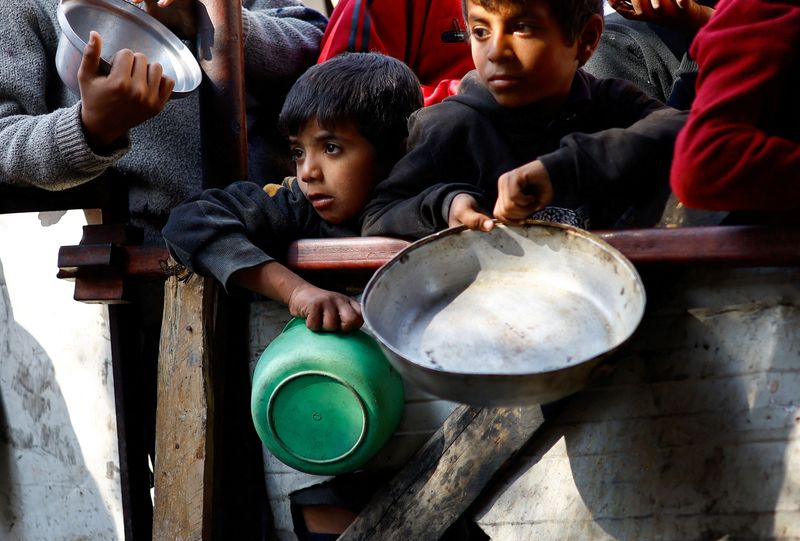
©Reuters. FILE PHOTO: Palestinians wait to receive food cooked by a charity kitchen amid shortages of food supplies, amid the ongoing conflict between Israel and the Palestinian Islamic group Hamas, in Rafah, in the southern Gaza Strip, on January 16, 2024. REUTERS/Ib
By Nidal al-Mughrabi and Emily Rose
DOHA/JERUSALEM (Reuters) – Trapped in and around Rafah, more than a million Palestinians prepared for Israel to complete a plan to evacuate them and launch a ground assault against Hamas fighters in the southern city of Gaza.
Humanitarian agencies have warned that large numbers of civilians could die in Israel’s offensive, and the U.N. agency for Palestinian refugees said it did not know how long it could operate “in a high-risk operation.”
“There is a sense of growing anxiety, of growing panic in Rafah,” said Philippe Lazzarini, head of the UNRWA agency. “People have no idea where to go.”
Israeli Prime Minister Benjamin Netanyahu’s office announced on Friday that the military had been ordered to develop a plan “to evacuate the population and destroy” four Hamas battalions that were reportedly deployed in Rafah.
Israel cannot achieve its goal of eliminating the Islamic militants who rule Gaza as long as these units remain, he said.
The statement, released two days after Netanyahu rejected a Hamas ceasefire proposal that would include the release of hostages held by Palestinian militants, provided no further details.
Washington, Israel’s main backer, has said it will not support an attack that does not protect civilians and briefed Israel on a new US national security memorandum reminding countries receiving US weapons to adhere to international law.
“There are no new standards in this document. We are not imposing new standards for military aid,” White House spokeswoman Karine Jean-Pierre told reporters. “They (the Israelis) reiterated their willingness to provide these kinds of guarantees.”
More than a million people pushed south by more than four months of Israeli bombing of Gaza are crammed into Rafah and surrounding areas on the coastal enclave’s border with Egypt, which has reinforced its border, fearing an exodus.
Doctors and aid workers struggle to provide even basic aid to Palestinian refugees around Rafah. Many are trapped against the fence on the border with Egypt and living in makeshift tents.
Israeli forces are moving south towards the city, after first storming northern Gaza in response to the October 7 incursion into southern Israel by Hamas gunmen.
The United Nations has said Palestinian civilians in Rafah need protection, but there should be no forced mass displacement, which is prohibited under international law.
“No war can be allowed in a giant refugee camp,” said Jan Egeland, secretary general of the Norwegian Refugee Council, warning of a “bloodbath” if Israeli troops moved into Rafah.
The Palestinian presidency has said Netanyahu’s plans aim to displace the Palestinian people from their land.
“Taking this step threatens security and peace in the region and the world. It crosses all red lines,” said the office of Mahmoud Abbas, head of the Palestinian Authority which exercises partial self-rule in the Israeli-occupied West Bank.
An Israeli official who wished to remain anonymous said Israel would try to organize the relocation of Rafah residents, most of whom have fled there from the north, before any assault.
Gaza’s health ministry said at least 27,947 Palestinians had been killed in the conflict and 67,459 injured. Others may be buried under the rubble.
By Israeli counts, Hamas gunmen killed around 1,200 people and took 253 hostages in the October 7 rampage in southern Israel.
Nearly one in ten Gazans under the age of five is currently severely malnourished, according to initial UN data from arm measurements showing physical wasting.
The charity ActionAid said some Gazans were eating grass.
“Every single person in Gaza now suffers from hunger and people only have 1.5 to 2 liters of unsafe water per day to meet all their needs,” it reads.
“All were martyred”
Hours after Netanyahu’s statement, at least 11 Palestinians died in an Israeli airstrike on a house in Rafah, according to Hamas media.
Reuters could not independently verify these accounts.
Previous Israeli airstrikes killed at least 15 people, eight of them in the Rafah area, Palestinian health officials said.
“We were sleeping inside, and when the strike started, we were thrown out,” said Mohammed al-Nahal, an elderly Palestinian standing next to the rubble of his stricken building.
“It destroyed the whole house. My daughter was killed. My daughter, her husband, her son, they were all martyred.”
The Israeli army said its forces were in action in the Khan Younis area and in northern and central Gaza to eliminate militant cells and destroy militant infrastructure.
It says it is taking measures to avoid civilian casualties and accuses Hamas militants of hiding among civilians, including in schools, shelters and hospitals. Hamas denied doing so.
This week Hamas proposed a 4 1/2-month ceasefire, during which the remaining hostages would be freed, Israeli troops would withdraw and an agreement on ending the war would be reached.
Netanyahu rejected Hamas’s words as “delusional”, a response to a plan developed by US and Israeli spy chiefs with Qatar and Egypt.